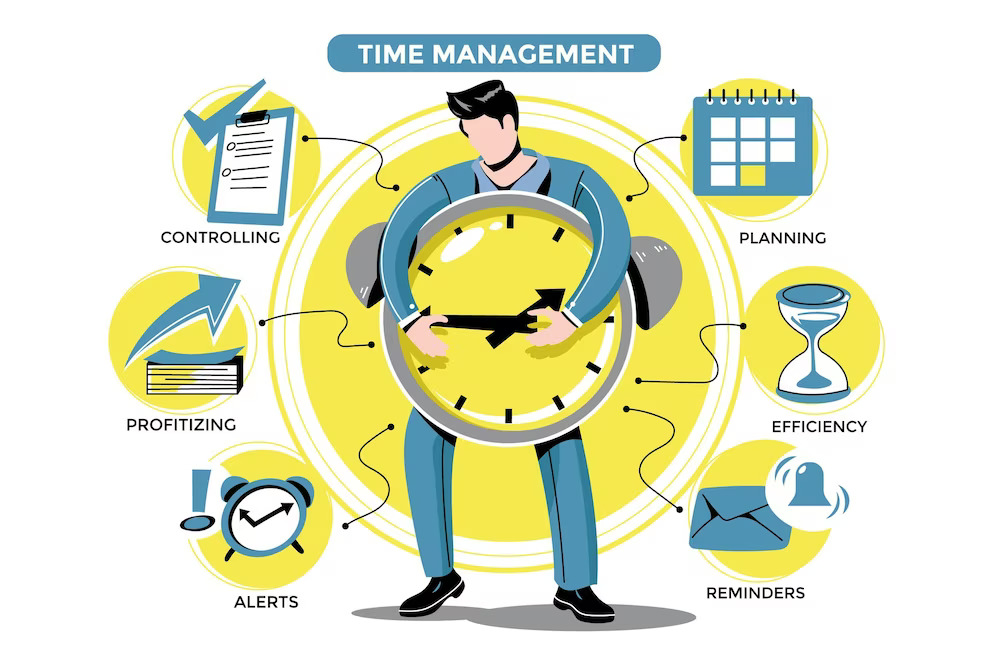Time Management Tips For Beginners
Mastering time management skills is crucial for academic success. Below are a few time management tips to get you started.
Find your optimal performance times (perhaps you are at your most alert in the morning, or you feel inspired late at night). You should schedule complex and challenging tasks during these high-performance periods while leaving less crucial ones for less productive periods to optimize your time.
Time Management Tips For Beginners
Prioritize Your Tasks
As busy professionals and homemakers, it’s easy to become overwhelmed with an endless list of tasks at both work and at home. Implementing a clear system to prioritize them will allow you to feel in control while ensuring you focus on those projects that matter the most to you.
Prioritize your tasks by compiling a comprehensive list of everything that needs to be completed and organizing it by deadline or magnitude; for multiple tasks with the same due date, prioritize them according to magnitude.
Once you’ve created your priority list, review it and decide on one task to focus on first – if unsure how best to proceed, seek input from colleagues or supervisors for advice.
Once you’ve decided on a task, schedule time in your calendar to complete it. This will prevent getting distracted from other more pressing matters and keep you from wasting time on less essential ones.
If a task is taking longer than anticipated, break it into smaller chunks and schedule them at different times throughout the day. This way, you can prioritize important tasks while leaving less urgent ones until later when your energy levels are better suited for the task.
Remind yourself that there are only 24 hours in each day, so prioritize which tasks require your attention when. Overworking can cause burnout, mental exhaustion and increase your risk for cardiovascular disease. You can click the link: https://www.who.int/long-working-hours-increasing-deaths-from-heart-disease-and-stroke for more information on this connection.
Block Out Your Time
Time blocking can be a great way to increase productivity, but it’s essential that beginners learn how to utilize it effectively. Newcomers often make rookie mistakes that derail the process and sap motivation, such as scheduling too many tasks at once.
Prior to creating a time block schedule, it’s essential that you compose a daily to-do list and identify your priorities. This will enable you to decide what types of tasks would best fit within each time block and for how long. Using an app for time tracking can help you determine how long your regular tasks take. Consider also task batching; an effective technique that involves grouping similar tasks together so as to complete them more quickly.
Once you have identified your priorities, it’s time to incorporate them into your calendar. Start by breaking large, complex tasks down into manageable chunks and estimating their completion times; overestimating will relieve some pressure and stress.
Make time blocks visible on your calendar as a powerful visual reminder of your commitments and avoid time wastage on unimportant tasks. Treat each time block like an appointment you must attend; don’t miss it!
Always set aside enough time for larger important tasks as well as smaller administrative ones, like replying to emails. This is especially essential when working on tasks requiring deep concentration. Otherwise, they could quickly become counterproductive.
When working on these projects, try to minimize distractions by turning your phone off or activating “Do Not Disturb” mode in your email app. Even if you don’t check your notification, studies prove that it impacts your concentration.
Take Breaks
Your body and mind need breaks, yet making the time can be challenging. One way to get better at taking breaks is creating and sticking to a break schedule; another option would be finding an accountability partner who will keep you on track with taking regular breaks.
If taking breaks still proves challenging for you, try using an app that offers timers that force you to stop working during breaks.
One of the best things you can do for your mental health is to ensure you prioritize yourself and your needs first. That is why prioritizing tasks and avoiding distractions during high-stress times are so crucial, not only preventing burnout but also helping you refocus.
Though it may seem counterintuitive to spend more time on tasks when feeling overwhelmed, spending extra time may actually help. According to Eat the Frog time management strategy, doing the most difficult or important task first may provide a confidence boost and motivate you to complete all other work tasks more quickly. Furthermore, prioritizing tasks will allow you to set boundaries between your work life and your personal life.
Once your priorities are clear, it’s essential that your breaks are free from distraction. Some forms of break can actually reduce productivity such as social media browsing, mindless snacking and chatting with coworkers; rather, consider your breaks an opportunity to detach from work and recharge. Going for a walk or doing yoga can keep your body active while increasing energy levels.
Many individuals are increasingly worried about the negative impact stress has on their work productivity and have turned to yoga as a solution for managing it and increasing focus. By bringing yoga into the workplace, one can achieve their goals and bring positive change through improved focus, better communication, and work-life balance.
Yoga increases one’s ability to focus and concentrate, as its relaxation effects help clear away clutter in your mind. Breathing exercises practiced in yoga help regulate oxygen flow to the brain which makes you more alert. Furthermore, yoga strengthens one’s decision-making abilities as it encourages planning tasks according to priorities and deadlines.
Yoga offers office workers who spend most of their days sitting behind desks a way to strengthen and stretch, which is essential in helping prevent back pain, carpal tunnel syndrome, and stiff shoulders from occurring.
Yoga also reduces stress and anxiety often experienced among workers at offices – an effect that ultimately increases productivity while improving both mental and physical well-being.
Successful leaders understand the value of taking time away from their computer screens to recharge, renew their creativity, and generate fresh ideas – this enables them to achieve outstanding results. Even short yoga sessions can have positive effects on physical and mental well-being.
Focus on One Task at a Time
If you find yourself switching tasks at an alarmingly rapid rate, it may be beneficial to switch your focus towards single-tasking. While multitasking may appear productive at first glance, research shows it actually lowers quality output as more projects come at once. Instead, prioritize each project according to importance and strive to complete each one before moving on to the next.
Building strong problem-solving skills is also crucial to keeping projects on schedule and on budget. By taking the initiative to address challenges quickly and maintain open communication channels with teammates, any roadblocks will be quickly addressed so they can be worked around as efficiently as possible.
As part of an overall effort to enhance your focus, learning how to decline requests that don’t align with your priorities or schedule is another way of strengthening it. Although it might be challenging at times, your colleagues will understand if you need to decline to help out on projects that don’t directly pertain to your role.
Finally, try setting a timer to gauge how long you can work before being distracted. Whether using the Pomodoro technique or just seeing how far you can get before your mind tells you to check email again, having an indicator on hand will keep you on task and on track.
Time management is an ongoing practice that demands focus, organization, and the ability to adapt quickly when interruptions arise. If you want to start developing effective time management skills, consider enrolling in one of the many time management courses available online or locally.
Set an Alarm
Timers can be useful tools for managing time and focusing on tasks more effectively. Distractions such as emails, text messages, blabbering coworkers, and browsing social media are one of the biggest productivity drainers at work, so setting an alarm clock may be one of the simplest and easiest ways to keep yourself on track and on task.
Add multiple alarms to your phone as a great way to remind yourself about important events or tasks throughout the day. By customizing their name, vibration settings, repeat/pause settings, and even snooze duration you can set multiple alarms that remind you about important events or tasks throughout the day.
Customize alarm sounds and vibrations, select which days of the week it should sound off, and delete individual alarms by tapping on them and selecting “Delete.”
On a Mac, you have several options for setting alarms: Clock app is built-in but third-party applications offer additional alarm options such as creating multiple reminders with notes attached that color-code them by task and color-coding them accordingly; they even nag you until completed!


















